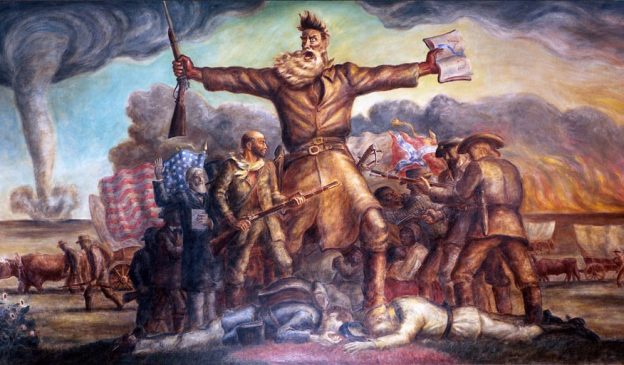The figure dominating this image, a highlight in the Kansas State Capital building, is that of John Brown (1800-1859). He was an infamous abolitionist who believed that armed conflict was the only way to overthrow the institution of slavery in the United States. Here he holds a Bible in his left hand, and a Sharps rifle in his right; he is a Moses-like figure straddling a river of blood between the waring Union and Confederate armies.
I grew up in abolitionist-founded Lawrence, Kansas over a hundred years after these events, but John Brown remained a figure in the collective memory of local myth. Along with many of my peers, I cheerfully and enthusiastically joined in rounds of the lively folk song:
John Brown’s body lies a-moldering in the grave
John Brown’s body lies a-moldering in the grave,
John Brown’s body lies a-moldering in the grave,
But his truth goes marching on.
One of the truths I learned growing up in a land of passionate and largely unchallenged belief was that religion has incredible power to motivate people. It brings out the best in people – and the worst. I learned that many people with passionate beliefs do not practice what they preach. However, others provided amazing inspirational examples of being willing to die for their moral principles.
But another thing I experienced was that the people around me often did not know much about what was going on around them, about their neighbours, or about the myths and history which continue to influence contemporary decisions. Because freedom of belief was a Constitutional Right, we did not often challenge others to explain their beliefs or behaviours.
And religion does matter – whether we are believers, atheists, or something in between, it is implicated in our societies if we like it or not. We need tools to understand the role it plays in creating political, social, economic and environmental problems. Religion also has the potential to inspire us to solve many of the global challenges we face today.
Today, Religious Studies offers us the interdisciplinary tools to understand and interact with those who may believe and practice things very different than ourselves. We use the tools of history and the humanities to better explore and understand ourselves and others. We also use the critical investigative tools of the social sciences to get an evidence base for what people are actually saying and doing, what these actions mean, and what might be the best ways to engage. In Religious Studies, we practice identifying the best available tools to address our questions in a disciplined, critical and evidenced based way.
To this end, my colleagues Hugh Beattie and Graham Harvey and I have designed a free FutureLearn course to highlight Why Religion Matters. This course is not a list of beliefs and practices of world religions to encourage greater tolerance. This course aims to give you the skills to critically engage with the world around you. It aims to encourage you not make assumptions, but to educate yourself to ask and engage actively with the meaning-making assumptions of both others – and yourself.

